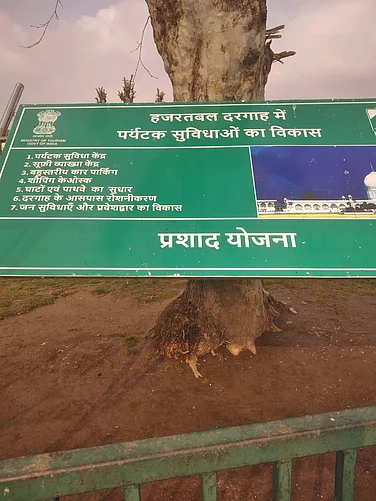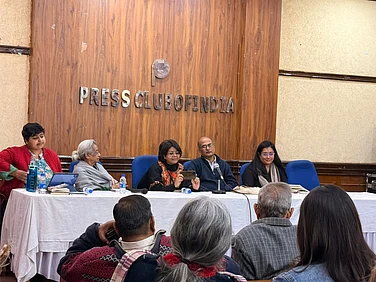ST KITTS, hawala, urea, JMM MPs, animal husbandry, housing, Sukh Ram.... As the list of scan dals involving ministers and MPs grows longer, there is a growing perception among parliamentarians that something needs to be done to stem the disrepute plaguing their ilk. Lengthy court proceedings apart, the need for internal vigilance and self-regulation is believed to be the need of the hour as the people grow weary and sceptical about Democratically Elected Representatives. And, incredible as it may sound, there is a growing demand within Parliament that ethics for MPs be formulated.
Allegations of corruption against MPs are far from a new phenomenon. Way back in 1951, just before Indias first Lok Sabha elections, Jawaharlal Nehru called his colleague in the Provisional Parliament, H.D. Mudgal to his chamber to ascertain whether he had accepted Rs 2,500 from the Bombay bullion market to raise a question in Parliament. Mavalankar, the then Speaker, constituted a special committee, on whose recommendation Mudgals membership was terminated. But in the years that have followed, public scepticism vis-a-vis probity in public life has simply snowballed and politician and corruption have almost become synonyms. For instance, a couple of years ago, a Rajya Sabha member was believed to have given his official blank letterheads to a Mumbai-based pharmaceutical company, no doubt for some personal benefit.
In July 1993, on the eve of the crucial vote of no-confidence against his government, Narasimha Rao announced a Rs 1 crore development scheme at the discretion of MPs in their respective constituencies. At the Congress parliamentary party meeting, he told fellow MPs: "I have made all of you crorepatis (multi-millionaires)." It was believed that Rao was on a make-MPs-rich spree, as the Jharkhand MPs bribery case would suggest.
Rao later issued an oral whip to Congress members of Parliament to bail out Justice V. Ramaswamy, who was found corrupt by a three-member judicial committee, while voting on impeachment. And during Raos tenure, at least 19 ministers were chargesheeted for corruption, as a result of which most of them resigned. All these cases, closely following the Jain Hawala scandal, have only helped bring Parliament under a cloud.
Now, for the first time, Parliament as an institution seems inclined to take cognisance of this public fury. Lok Sabha Speaker P.A. Sangma has solicited opinion from different political parties through their leaders on the desirability of constituting a permanent ethics committee to deal with complaints regarding the conduct of MPs outside Parliament. "There is more or less a consensus on the issue, but details are yet to be worked out," is the word from the Speakers office. And preliminary opinion seems to favour a committee modelled on the one which was set up in the United Kingdon last year based on the Lord Nolan Committee report (see box).
The need for such guidelines was highlighted by the Sukh Ram case. Sangma found himself in a quandary when members sought the former ministers disqualification as a member of the House following the seizure of over Rs 3 crore, all unaccounted for, from his residences. In this instance, Sangma has no convention to guide him.
"I gave the notice because his (Sukh Rams) behaviour is indignified and all MPs will be looked down upon by the public," says the Bharatiya Janata Partys Ram Naik, whose notice has been pending with the Lok Sabha Speaker for over two months now. "The matter needed a different, but urgent treatment, as it seemed outside the domain of the Privileges Committee."
Adds Rabi Ray, who was the Speaker in the 9th Lok Sabha: "Parliamentary privileges should not be a shield for MPs misconduct. There should be enough transparency and a mechanism to ensure that. An ethics committee could be a right beginning."
The demand for an ethics committee was first raised by veteran parliamentarian George Fernandes, who has been reiterating it time and again, after the hawala case came to light in 1991. Says his Samata Party colleague and MP, Nitish Kumar: "Yes, we would welcome the formation of the committee at the earliest. Parliament should be able to deal with erring members. And this will at least check the erosion of peoples faith in Parliament."
In fact, the Speaker of the 10th Lok Sabha, Shivraj Patil, had procured a copy of the Nolan Committee report amidst Opposition demands for an ethics committee, given the rising allegations of misconduct against MPs. However, Patil did not initiate any action in this context.
As for the present House, it would have to sort out a number of issues if such a committee is indeed to be formedespecially in identifying what constitutes misconduct on the part of MPs apart from their having interests, pecuniary or otherwise, in areas which obstruct or prejudice their role in Parliament. However, there are indications that Lok Sabha may tackle this by first constituting a study team to go into all these aspects. Certainly, ethical conduct cannot be enforced only through law. But human behaviour and conductof parliamentarians in this casecan surely be regulated to a large extent. The proposed committees success will lie in attempting just that.


























